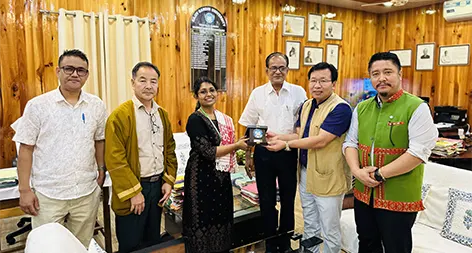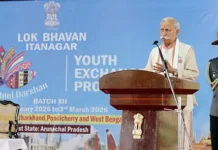RONO HILLS, 11 Apr: A team from the Development of North Eastern Region (DoNER) Ministry, led by Undersecretary Parna Sahana, visited Rajiv Gandhi University (RGU) from 10-11 April to review the projects funded under the North Eastern Council schemes.
The primary focus of the visit was the project titled ‘Promotion and Literary Development of Mother Languages of Arunachal Pradesh’, implemented by the Arunachal Institute of Tribal Studies (AITS), RGU. The team conducted an extensive site inspection, concentrating on the documentation of endangered languages, oral narratives, and the preservation of cultural heritage belonging to lesser-known indigenous communities of Arunachal Pradesh.
This inspection was part of the ministry’s ongoing commitment to cultural preservation and holistic regional development across the northeastern states. The initiative seeks to document, conserve, and promote the linguistic heritage of tribal regions, particularly those facing the threat of cultural and linguistic extinction.
RGU Acting Vice-Chancellor Prof SK Nayak underscored the university’s active role in community-driven research and outreach. “RGU’s involvement in this project reaffirms its enduring mission to serve the people of Arunachal Pradesh and safeguard their rich cultural and linguistic traditions,” he said.
Sahana expressed satisfaction with the progress made and the dedication exhibited by the university, particularly by the team of researchers and investigators of the AITS, in implementing the project.
Praising the team’s efforts, she said, “Language is not just a means of communication but a vessel of identity and heritage. The commitment of RGU’s researchers in preserving these fragile linguistic traditions is truly commendable.”
RGU Registrar Dr NT Rikam reiterated the university’s commitment to extending full institutional support for the successful execution of such culturally vital initiatives. He also recommended a follow-up study to assess the project’s long-term impact.
Speaking on fund utilisation, RGU Finance Officer Prof Otem Padung emphasised the importance of financial accountability, and timely and efficient fund utilisation to meet the project’s objectives.
RGU Joint Registrar Dr David Pertin highlighted the significance of close coordination among all stakeholders involved in the implementation and evaluation processes. He noted that interdisciplinary and inter-institutional collaboration has been crucial to the project’s success. He also informed the visiting team about the various outputs of the project, including books, articles, dictionaries, and documentaries on the Ashing, Brokpa, and Nah tribes.
AITS Director Prof Jumyir Basar stated that “the project is in perfect alignment with the institute’s vision of documenting, preserving, and promoting the indigenous knowledge systems of Arunachal Pradesh.”
During an interaction session, co-principal investigator Dr Tarun Mene emphasised the fieldwork-intensive nature of the project, saying, “This initiative has brought together scholars, local communities, and policymakers to ensure that indigenous voices are not only recorded but also respected and revived.”
He added that several tangible outcomes have already been achieved as a result of the project.
Co-principal investigator Dr Lisa Lomdak from RGU’s Centre for Endangered Languages, remarked, “It’s a privilege to be part of a project that empowers communities by giving voice to their cultural and linguistic heritage.”
AITS linguistics faculty member Dr Wanglit Mongchan expressed appreciation for the university’s engagement with tribal communities, stating that “such projects are vital for documenting languages and oral traditions before they disappear.”
The DoNER team also visited other projects funded by the ministry on the university campus and toured the Tribal Heritage Museum of RGU.


